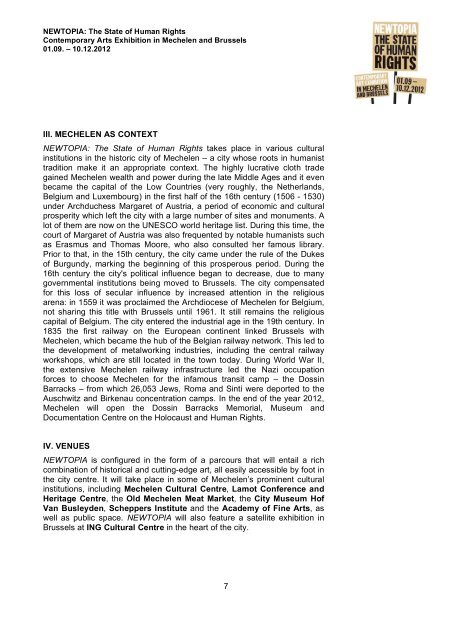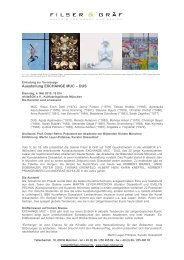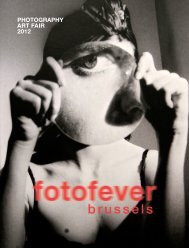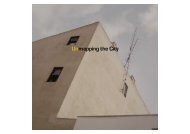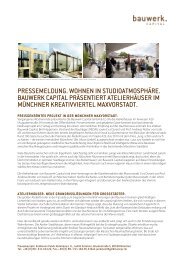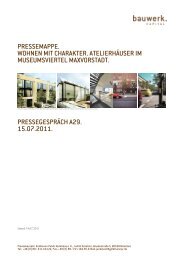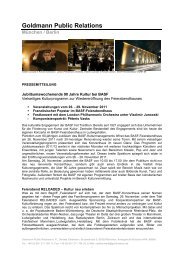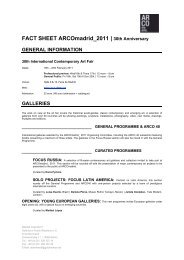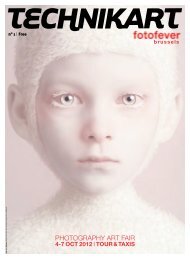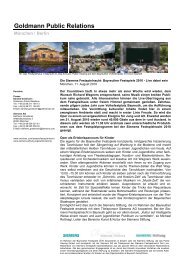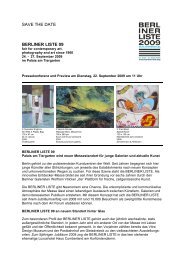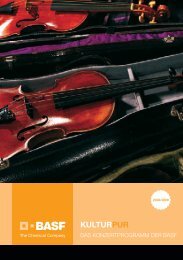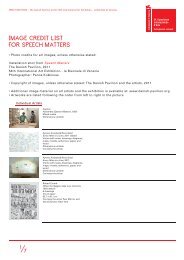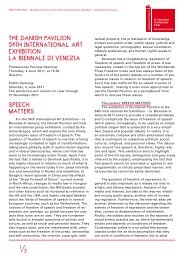Press Kit (August 30th/31st, 2012) - Goldmann Public Relations ...
Press Kit (August 30th/31st, 2012) - Goldmann Public Relations ...
Press Kit (August 30th/31st, 2012) - Goldmann Public Relations ...
Create successful ePaper yourself
Turn your PDF publications into a flip-book with our unique Google optimized e-Paper software.
NEWTOPIA: The State of Human Rights<br />
Contemporary Arts Exhibition in Mechelen and Brussels<br />
01.09. – 10.12.<strong>2012</strong><br />
III. MECHELEN AS CONTEXT<br />
NEWTOPIA: The State of Human Rights takes place in various cultural<br />
institutions in the historic city of Mechelen – a city whose roots in humanist<br />
tradition make it an appropriate context. The highly lucrative cloth trade<br />
gained Mechelen wealth and power during the late Middle Ages and it even<br />
became the capital of the Low Countries (very roughly, the Netherlands,<br />
Belgium and Luxembourg) in the first half of the 16th century (1506 - 1530)<br />
under Archduchess Margaret of Austria, a period of economic and cultural<br />
prosperity which left the city with a large number of sites and monuments. A<br />
lot of them are now on the UNESCO world heritage list. During this time, the<br />
court of Margaret of Austria was also frequented by notable humanists such<br />
as Erasmus and Thomas Moore, who also consulted her famous library.<br />
Prior to that, in the 15th century, the city came under the rule of the Dukes<br />
of Burgundy, marking the beginning of this prosperous period. During the<br />
16th century the city's political influence began to decrease, due to many<br />
governmental institutions being moved to Brussels. The city compensated<br />
for this loss of secular influence by increased attention in the religious<br />
arena: in 1559 it was proclaimed the Archdiocese of Mechelen for Belgium,<br />
not sharing this title with Brussels until 1961. It still remains the religious<br />
capital of Belgium. The city entered the industrial age in the 19th century. In<br />
1835 the first railway on the European continent linked Brussels with<br />
Mechelen, which became the hub of the Belgian railway network. This led to<br />
the development of metalworking industries, including the central railway<br />
workshops, which are still located in the town today. During World War II,<br />
the extensive Mechelen railway infrastructure led the Nazi occupation<br />
forces to choose Mechelen for the infamous transit camp – the Dossin<br />
Barracks – from which 26,053 Jews, Roma and Sinti were deported to the<br />
Auschwitz and Birkenau concentration camps. In the end of the year <strong>2012</strong>,<br />
Mechelen will open the Dossin Barracks Memorial, Museum and<br />
Documentation Centre on the Holocaust and Human Rights.<br />
IV. VENUES<br />
NEWTOPIA is configured in the form of a parcours that will entail a rich<br />
combination of historical and cutting-edge art, all easily accessible by foot in<br />
the city centre. It will take place in some of Mechelen’s prominent cultural<br />
institutions, including Mechelen Cultural Centre, Lamot Conference and<br />
Heritage Centre, the Old Mechelen Meat Market, the City Museum Hof<br />
Van Busleyden, Scheppers Institute and the Academy of Fine Arts, as<br />
well as public space. NEWTOPIA will also feature a satellite exhibition in<br />
Brussels at ING Cultural Centre in the heart of the city.<br />
7


